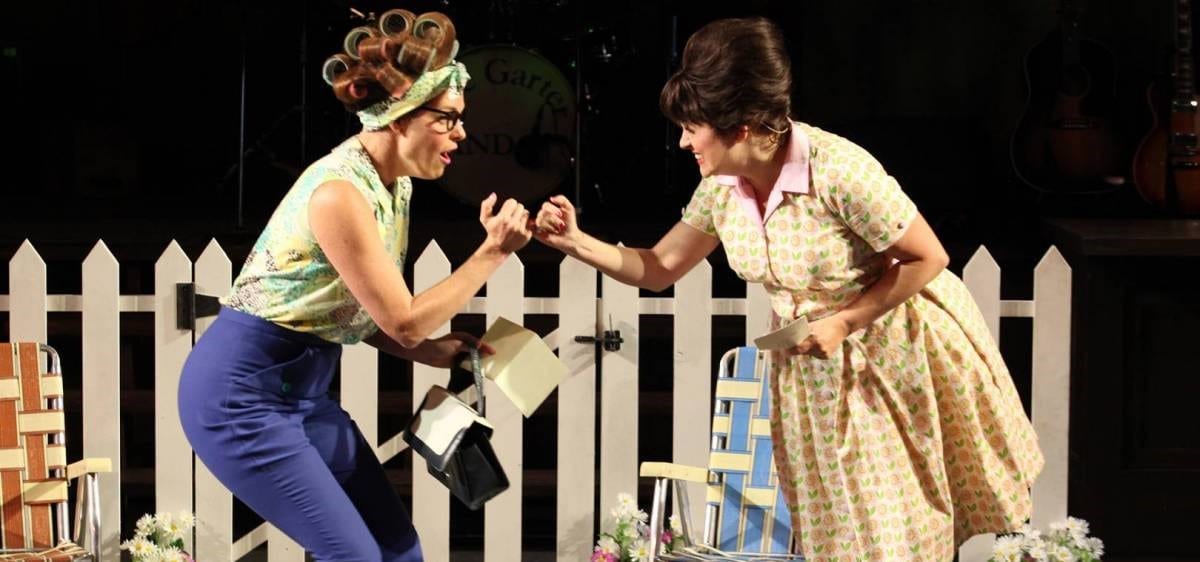There is a reason why The Merry Wives of Windsor is not one of Shakespeare’s most-loved plays, nor one of his most-studied: it is, largely, froth. However, that is something this production embraces, engulfing the play in a hearty dose of 1960s pop culture and country music. The setting – an inn with an open mic night – is cosy, and enables the live musicians to strut comfortably around the stage, as well as providing a means by which to justify the frequent musical numbers. The late ‘60s setting also allows them to bring in a hippy vibe, bringing a hilariously trippy edge to the fairy scene. The production notes emphasise the fun and liveliness they are aiming for, and this seems particularly appropriate in the festival setting.
Vancouver’s Bard on the Beach Shakespeare festival is a bustling affair, largely staffed by volunteers, and with plays preceded by educational talks. Consisting of a group of tents clustered by the waterfront, there is a kind of pageantry feeling to it all, which seems an appropriate setting for Merry Wives. Amongst the audience – many of whom return year after year – there is clearly a huge amount of goodwill towards the festival, which gives the entire occasion a cheery atmosphere.
As actors and musicians wander onto the stage, the audience hubbub continues, this slightly chaotic beginning giving the entire proceedings a sense of informality. This is a production where everything is turned up to 11, with almost Lurhmann levels of vibrancy and excitable (and, occasionally, somewhat shouty) delivery. Side characters are shoved into Hollywood greaser/geek clichés, which makes for broad stroke acting and somewhat cuts off the possibility of doing anything more interesting with the characters (although there is a nice touch from Doctor Caius at the end). Much like at Shakespeare’s Globe, there is almost a pantomime feel at points, with bags of audience interaction and innuendo.
The proto-feminism of the play is played up enormously and, in the 1960s setting, this works, providing a platform for Amber Lewis and Katey Wright’s superb comic timing (Mistresses Ford and Page, respectively). Their success as a duo means the play becomes an exultant celebration of female friendship, helped on its way by two stand-out performances of These Boots Are Made for Walkin’. The play delights in its own lack of naturalism, and whilst this makes for a free-wheeling sense of fun, it also means that, during the musical numbers, there is no real regard for what characters would be doing – or if they would be there at all.
However, despite these niggling questions, the musical numbers are by far and away the best decision made by director Johnna Wright. They often only make sense tangentially, and are driven more by a love of the music than anything else, but, frankly, if you can make The Merry Wives of Windsor truly memorable in any way, then this is probably the way to do it. Music aside, Jennifer Lines and Andrew Chown (Mistress Quickly and Doctor Caius) have some great physical comedy scenes together, and Anton Lipovestsky’s multi-talented turn as the Host gets some of the biggest laughs of the show. Chown is generally good, although his exaggerated French accent means some of the punchlines do get lost, an issue also found in the rushed delivery of Daniel Doheny (Fenton). Accents are a bit of a problem in this particular production – the Welsh accent employed by Andrew McNee (as Pastor Hugh Evans) is patchy even at its best.
This is not a play for those wishing to indulge in the beauty of Shakespeare’s language, or his study of human character – but it is a production that provides a generous helping of rollicking good fun, and sometimes that is just what you need.

